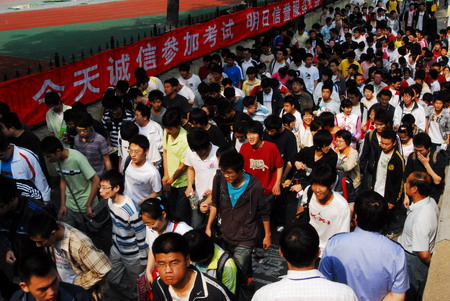 |
|
Students arrive for the first day of the annual national college entrance exam at a middle school in Yantai, east China's Shandong province, June 7, 2008. Starting Saturday, a record 10.5 million Chinese youngsters will sit for the three-day annual exam this year. [Xinhua]
|
BEIJING -- China's college entrance examination (CEE) in 1977 and 1978 changed the fate of a group of Chinese with a large age gap and from all walks of life. Thirty years on, some of them anxiously waited outside exam venues praying for good luck for their only children.
On July 7, 1978, a noodle factory worker surnamed Tang walked into a CEE venue. He had not been in a classroom for eight years. "I felt just so good sitting there."
Working now in a media organization, Tang recalls his experience 30 years ago. "I remembered how I felt so concentrated that I even forgot myself."
However, Tang's son finds it hard to share the same excitement. On Saturday, when the 18-year-old walked into a clean exam room, he expected time passes quickly on the one hand, but on the other, wished the exam had not been started.
The teenager is one of a record 10.5 million young Chinese on Saturday and Sunday who participated in the national CEE, the largest of its kind in the world.
The Ministry of Education says 5.99 million of the 10.5 million participants will be able to enter college, a rate that is a lot higher than that of Tang senior's era.
Of course, exam-takers in that era did not expect much from the exam. Some just wanted to "sit in the examination room for a while to feel the long-lost school life."
In 1978, after a brief three-month preparation, Tang signed up for the exam with a primary-school diploma, abundant self-study experience and the great encouragement from his family and friends.
"I cannot recall clearly how I went home after I received the college admission notice. I could not sleep that night," said Tang who was ultimately admitted into the Chinese Literature Department of Sichuan University in the country's southwest, with his scores ranking second in his county.
Ji Yunxiang was not so lucky. In 1977, he attended the exam, the first after the decade-long Cultural Revolution ending in 1976, in order to "escape the countryside." However, he failed.
As an "educated youth," Ji and his classmates went to the countryside "to live and labor together with farmers" after graduating from high school, in order to echo late Chairman Mao Zedong's call that "Urban youth should learn more from farmers."
Finally, he attended a professional school and obtained a diploma in mechanical engineering. This enabled him to work as an engineer in the Xi'an Railway Bureau.
Sitting outside an exam venue for hours waiting for his daughter, Ji says conditions are much better now as little time was allowed for study when his fellow classmates and himself labored in countryside.
Although study conditions have become much better and enrolment rates much higher, up from single digit 30 years ago to more than 50 percent, student pressure is bigger than ever.
Chinese describe CEE, or gaokao in Chinese, as "thousands of troops on a single-log bridge" because of the limited placements in university enrollment. For students in poverty-stricken rural areas, the tough exam could be their only opportunity to escape the rigors of country life.
A survey conducted by the Ministry of Education and China Youth Daily showed 89.6 percent of those polled felt their fate was changed by the exam. Among those who said their fate was "totally changed," 69.1 percent came from the countryside and only 30.9 percent were from cities.
Meanwhile, Chinese social sentiment stresses too much on a university diploma. It is believed that one surely could not find a decent job without a college certificate, and jobs become less and less even for college graduates.
Ji said the CEE could change people's fate 30 years ago and the exam now can decide children's future, especially that of rural students.
"Regardless in which era, study can influence the development and quality of life," said Ji, adding it's a top priority for them to show care to children's physical conditions. But as for alleviating the mental pressure, Ji does not know what to suggest.

